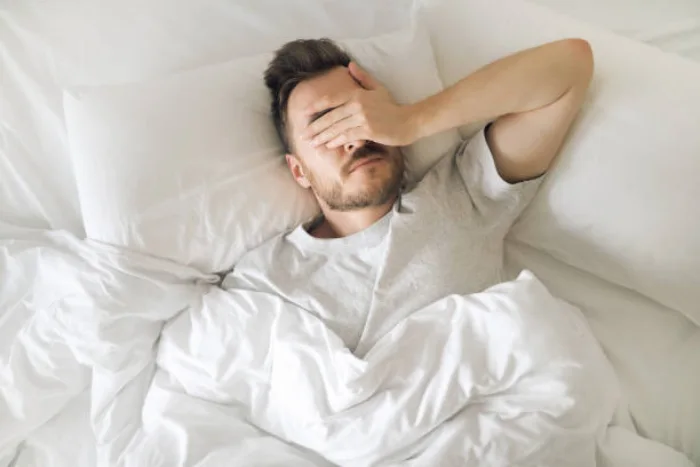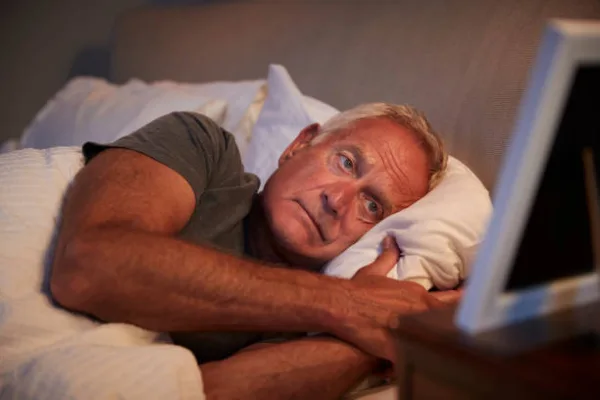Anxiety during sleep is an unwelcome nuisance that disrupts the tranquility of your nights. It suddenly hits you as you snuggle into your cozy bed, ready to drift off into a peaceful slumber. But what triggers these intense feelings seemingly out of nowhere?
Various factors can contribute to the onset of anxiety during sleep, many of which are rooted in our physical and emotional states.
Sleep disorders, medication side effects, and caffeine intake can contribute to anxiety during sleep. Other sources of nighttime anxiety can be complex and multifaceted.
We will explore some of the most common anxiety triggers during sleep and offer insights into managing and overcoming these anxious feelings. So get ready to explore sleep anxiety and discover how to find peace and restfulness again.
What Triggers Anxiety During Sleep? Factors That Matter
It is possible to experience anxiety during sleep for some reasons. The following are a few of the main reasons:
- Nightmares and Night Terrors
- Sleep Disorders Connection
- Stress and Worry
- Traumatic Experiences Impact
- Fear of the Unknown
- Medication Side-Effects
- Overactive Imagination During Sleep
- Sleep Deprivation Effects
- Inadequate Sleep Environment
Let’s talk about it in more detail.
1. Nightmares and Night Terrors
Nightmares and night terrors are two common culprits that trigger anxiety during sleep. You can wake up in a panic when you have nightmares because they’re vivid and disturbing.
On the other hand, night terrors are intense episodes of fear that occur during deep sleep and can cause you to scream, thrash, or exhibit other signs of extreme distress. These unsettling experiences can keep you up at night and make you anxious.
2. Sleep Disorders Connection
The connection between sleep disorders and unsettling experiences during the night can leave you feeling scared and shaken, even after you wake up.
Sleep disorders such as insomnia, sleep apnea, and restless leg syndrome can disrupt your sleep and increase the likelihood of experiencing nightmares and night terrors.
There is evidence that these sleep disorders can trigger anxiety during sleep, disrupting the normal sleep cycle and causing high levels of arousal and fear.
3. Stress and Worry
Feeling stressed and worried can make having a peaceful night’s sleep difficult. When your mind is filled with stress and worry, relaxing and letting go of the day’s events becomes challenging.
Research shows that anxiety triggers during sleep can lead to insomnia, nightmares, and restless nights. The constant rumination and racing thoughts can disrupt your sleep cycle, leaving you feeling fatigued and drained the next day.
4. Traumatic Experiences Impact
Experiencing traumatic events can deeply impact you, making finding peace in your sleep difficult. Trauma can lead to anxiety disorders, including post-traumatic stress disorder (PTSD), which can cause nightmares, insomnia, and restless sleep.
The brain’s response to trauma can disrupt the normal sleep cycle, leading to heightened arousal and hypervigilance even during sleep.
Seeking therapy and support can help address the impact of trauma on sleep and overall well-being.
5. Fear of the Unknown
Navigating the unknown can be a source of fear, leaving you restless and unsure. During sleep, this fear of the unknown can trigger anxiety.
According to research, the brain is wired to seek certainty and predictability. Therefore, when faced with uncertainty, the stress level may increase.
This can manifest as anxiety during sleep, causing sleep disturbances and restlessness. Understanding and addressing this fear of the unknown is crucial in managing sleep-related anxiety.
6. Medication Side-Effects
Dealing with medication side effects can greatly impact your sleep quality and leave you feeling restless and uncertain. Certain medications can disrupt your sleep patterns and cause insomnia.
These side effects can include difficulty falling asleep, waking up frequently at night, and experiencing vivid or disturbing dreams.
You need to discuss your concerns about medication side effects with your healthcare provider to find the best solution for your sleep and overall well-being.
7. Overactive Imagination During Sleep
Having an overactive imagination at night can turn your dreams into a wild and captivating movie playing in your mind.
Research suggests that this can trigger anxiety during sleep. Your imagination may create vivid scenarios that elicit fear, worry, or stress, causing your body to respond with increased heart rate, shallow breathing, and even sweating. This can disrupt your sleep, leaving you feeling restless and anxious the next day.
If you are experiencing overactive imagination during sleep, establish a bedtime routine that incorporates calming activities such as reading, practicing meditation, or deep breathing. Keep your bedroom dark, quiet, and distraction-free so you can sleep well.
Incorporate relaxation exercises like progressive muscle relaxation or guided imagery to calm your mind and body before sleep.
8. Sleep Deprivation Effects
Sleep deprivation can have a profound impact on your overall well-being and cognitive function. Lack of sleep can increase anxiety levels, affecting the brain’s ability to regulate emotions and stress.
When you’re sleep-deprived, you’re more likely to feel anxious, like racing thoughts, irritability, and trouble concentrating.
Also, chronic sleep deprivation can weaken your immune system and increase the risk of developing mental health disorders, including anxiety disorders.
9. Inadequate Sleep Environment
An inadequate sleep environment can also trigger anxiety during sleep. Factors such as excessive noise, uncomfortable temperatures, and poor air quality can disrupt your sleep and contribute to feelings of restlessness and unease.
You should create a sleep environment that promotes relaxation and reduces anxiety to ensure a good night’s sleep.
What is the best position to sleep in for anxiety?
The best position to sleep for anxiety is lying on your back, which relieves stress and promotes a calm state of mind. Back sleeping is widely considered the optimal position for your spine, as it maintains a neutral alignment and prevents any curving or folding of the body.
This position not only benefits your spine but also aids in reducing anxiety, making it an ideal choice for a restful night’s sleep.
Does sleep anxiety ever go away?
Sleep anxiety can improve over time with the appropriate treatment and strategies. While it may not be possible to eliminate sleep anxiety completely, it can be managed effectively.
Treatment options may include techniques like cognitive-behavioral therapy (CBT) and good sleep hygiene practices. Also, medications like Pregabalin, which is an FDA-approved medication used to treat anxiety disorders and neuropathic pain, may help alleviate sleep anxiety.
You should only take Pregabalin under the guidance and prescription of a healthcare professional. If you’re going to buy Pregabalin from online, be sure it’s from a reputable, licensed seller.
Embrace Tranquil Nights: Say Goodbye to Sleep Anxiety
Now that you understand the various anxiety triggers during sleep, you need to take steps to address them. Creating a relaxing sleep environment, establishing a calming bedtime routine, or seeking therapy for trauma-related anxiety are all ways to reduce anxiety during sleep.
It’s no secret that sleep plays a critical role in our overall health and well-being. So, take charge of your sleep today and explore the many resources available to help you manage anxiety during sleep and get the rest you deserve.




